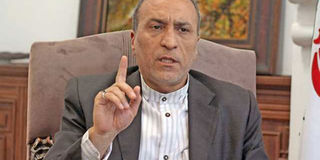Iran envoy denies role in plot to free terror suspects

Dr Hadi Farajvand, Iran’s ambassador to Kenya, speaking at the country's embassy in Nairobi on February 25, 2019. PHOTO |DENNIS ONSONGO | NATION MEDIA GROUP
What you need to know:
The diplomat admits meeting two suspects, who reportedly defrauded him of an unknown amount of money on the pretext that they could secure the release of the suspects.
- The Directorate of Criminal Investigation (DCI) on Friday arrested Mr Wesley Kiptanui Kipkemoi and Mr Shemgrant Agyei.
The ambassador says Mr Kipkemoi and his friend had contacted him by phone regarding the deal to release the two Iranians.
The Iranian ambassador to Kenya, Dr Hadi Farajvand, who has been linked to a failed attempt to secure the release of two Iranian terror suspects from police custody, now claims he is being victimised.
The diplomat admits meeting two suspects, who reportedly defrauded him of an unknown amount of money on the pretext that they could secure the release of the suspects — Ahmad Abolfathi Mohammed and Sayed Mansour Mousavi — but denies doing business with the two men.
THREATENED
The Directorate of Criminal Investigation (DCI) on Friday arrested Mr Wesley Kiptanui Kipkemoi and Mr Shemgrant Agyei. They were charged in court on Monday.
The ambassador says Mr Kipkemoi and his friend had contacted him by phone regarding the deal to release the two Iranians.
“They said the terror suspects were going to be freed by the government of Kenya and that they were contacting me on behalf of the Ministry of Interior, which I found suspect because the said ministry could have contacted us directly. They, however, did not reveal their names,” the ambassador said during a press briefing at the Iranian Embassy in Lower Kabete, Nairobi.
He added: “We had a meeting last Friday with the callers - on that day they were four people - but I left shortly after they refused to reveal their names to me. I told them that I would give their mobile phone contacts to the police if they failed to disclose their names, but they threatened back, saying they would go to the media if I reported them.”
In the saga that began in 2012, Mr Mohammed and Mr Mousavi claimed they had come to the country as tourists when they were arrested. They were, however, linked to a lethal explosive identified as RDX and were accused of planning a terror attack. A Nairobi court sentenced them to life imprisonment.
HIGH-LEVEL CONTACTS
The sentence was later reduced to 15-years in jail, after they appealed to the High Court. When they moved to the Court of Appeal, three judges quashed the sentence and set them free.
But the Director of Public Prosecutions moved to the Supreme Court to challenge their release, with the judges allowing the police to hold the suspects until a decision is made on their fate.
Police sources told the Nation last week that the ambassador had been looking for high-level contacts in government who could help him to secure the release of Mr Mohammed and Mr Mousavi. Police suspect the two are members of the Quds Force — an elite unit of Iran's Revolutionary Guard that carries out covert foreign missions, including terror attacks.
The ambassador was reported to have been so confident that the two suspects would be freed that he went to an airline’s office, alongside an aide, to book three tickets — his, Mr Mohammed's and Mr Mousavi's — to leave the country. But things are reported to have fallen apart when the envoy realised there was no release plan and he reportedly cancelled the tickets.
“Even if they were to be released, they would be escorted by the police to the airport and I still would not access them,” the envoy said.





